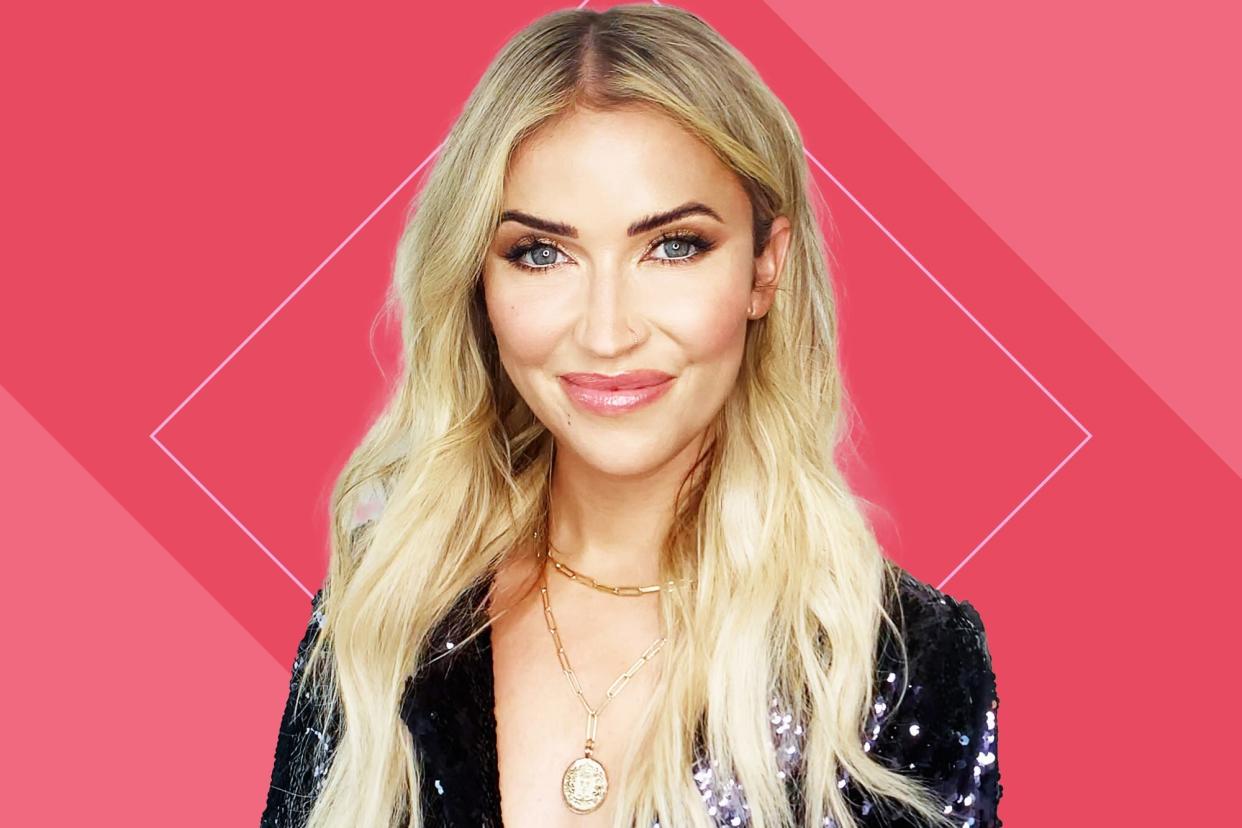Kaitlyn Bristowe Opened Up About Experiencing 'Hormonal Depression' — What Is That?

- Oops!Something went wrong.Please try again later.
Getty Images
Anyone who's caught Kaitlyn Bristowe in action on any iteration of the Bachelor franchise knows the TV personality and podcast host isn't one to sugarcoat the truth. So when the 36-year-old found herself desperate to, in her words "crawl into [her] own bed and cry" on Monday, Bristowe decided to share the struggle with her millions of Instagram followers rather than hide behind a fake smile.
"I wanted to take a break from my glam shots, filtered photos, trips, and my tour, to let you know I also struggle with mental health," she wrote in the caption alongside a picture of her lounging in the backseat of a car and clutching an iced coffee. "This page is mainly my highlight reel, but I love to mix in some raw shit to keep it real."
Bristowe goes on to share that she's been having a particularly tough time during her period — so much so, in fact, that she had "just sat on a 5 hour flight talking [herself] out of a panic attack." The reason for her "spiral" and recent emotional struggles? "Hormonal depression like a MF." (Related: Kaitlyn Bristowe Just Shared the Most Honest #Realstagram)
"Hormonal depression" in and of itself isn't an official medical diagnosis recognized by the Diagnostic and Statistical Manual of Mental Disorder (DSM), the catalog of psychological conditions widely used by clinicians to diagnose patients. But just because the term itself doesn't have a clinical definition doesn't mean it's not real. In general, hormones such as "estrogen, progesterone, and testosterone play important roles in women's emotions," says Poonam Desai, D.O., a New York City-based physician board certified in lifestyle medicine and emergency medicine. "And imbalances [of these hormones] may contribute to depression."
There are a whole host of ways hormones can get out of whack and become imbalanced. Everything from a lack of zzz's to thyroid disorders and more can affect the levels of chemical messengers — aka hormones — in your body. "Hormone fluctuations can cause a change in serotonin (also known as the happy hormone) which can lead to changes in mood including depressed state and depression," notes Dr. Desai. Stress can also negatively impact your hormones: Research shows that stress can increase your production of the hormone cortisol, which can trigger a fall in estrogen levels. And decreased estrogen can cause mood swings (such as those you deal with right before Aunt Flo comes to town), anxiety, and depression, according to the University of Rochester Medical Center Health Encyclopedia.
While many people are familiar with premenstrual syndrome (PMS), the condition isn't necessarily synonymous with the type of "hormonal depression" Bristowe seems to be talking about. Sure, PMS is often characterized by moodiness, irritability, and even sadness — in addition to, of course, a slew of other rather unpleasant symptoms (see: bloating, headaches, etc.). But these emotional difficulties brought on by changing hormones are often even more intense with hormonal depression. Plus, as mentioned above, hormonal depression might very well be caused by an overall hormonal imbalance that's not necessarily related to the typical hormonal fluctuations of the reproductive cycle.
It's important to note that hormonal depression is also not the same as premenstrual dysphoric disorder (PMDD), which, BTW, is an official diagnosis in the DSM. Essentially a more severe form of PMS, PMDD is a condition that occurs in the week or two leading up to your period and involves symptoms such as severe depression, hopelessness, irritability, even suicidal thoughts, according to the Office on Women's Health (OASH). "Symptoms of PMDD can be so severe that they can affect daily tasks and can affect one's ability to function at home, work, and/or in relationships," notes Dr. Desai. As with PMS, the exact causes of PMDD are unknown, "but research does suggest that it can be due to fluctuations in hormones and how sensitive a person is to these fluctuations," she adds. (Related: The Signs and Symptoms of PMDD (Plus How to Treat It))
It's unclear whether Bristowe has experienced PMS or PMDD, but according to her Instagram, the monthly depression is so intense, "it puts [her] relationship through hard times" (Bristowe is engaged to fiancé Jason Tartick) and "it puts [her] in shameful spirals."
The good news about issues such as PMS and PMDD is that there are effective treatments for easing symptoms. "If you are experiencing any symptoms associated with your menstrual cycle, please talk to your doctor," says Dr. Desai. A thorough medical and physical exam may be necessary to diagnose PMS and PMDD. Some treatment options your doctor may recommend include antidepressants, oral contraceptives, and lifestyle modification like regular exercise, decreasing caffeine consumption, [getting] seven to eight hours of daily sleep, stress management (like mindfulness and yoga), decreasing alcohol consumption, and smoking cessation." (Related: The Best Way to Reduce Your PMS Symptoms, According to Science)
While she didn't mention whether she's seeking out professional help or treatment for her own struggles, Bristowe did say that she hopes to inspire more conversation around mental health (and hormones) with her own candor. "I used to think I was bat shit CRAZY, and I never put two and two together that it was always around the same time," she wrote. "Hormones are the devil and they are stronger than me...I'm here to chat in the comments on this drive about how you are all feeling today! Good or bad."
Considering the "#Realstagram" has racked up over 135,000 likes and over 4,000 comments in just two days, it seems the reality TV star has accomplished her goal — and in doing so, sparked an important dialogue on the connection between physical and mental health.

